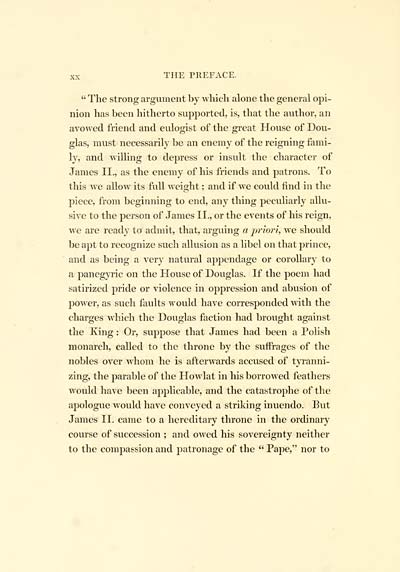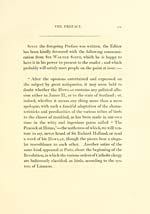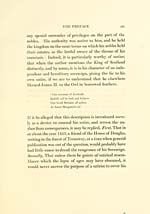Bannatyne Club > Buke of the Howlat
(40) Page xx
Download files
Complete book:
Individual page:
Thumbnail gallery: Grid view | List view

XX THE PREFACE.
" The strong argument by which alone the general opi-
nion has been hitherto supported, is, that the author, an
avowed friend and eulogist of the great House of Dou-
glas, must necessarily be an enemy of the reigning fami-
ly, and willing to depress or insult the character of
James II., as the enemy of his friends and patrons. To
this we allow its full weight ; and if we could find in the
piece, from beginning to end, any thing peculiarly allu-
sive to the person of James II., or the events of his reign,
we are ready to admit, that, arguing a jjriori, we should
be apt to recognize such allusion as a libel on that prince,
and as being a very natural appendage or corollary to
a panegyric on the House of Douglas. If the poem had
satirized pride or violence in oppression and abusion of
power, as such faults would have corresponded with the
charges which the Douglas faction had brought against
the King : Or, suppose that James had been a Polish
monarch, called to the throne by the suffrages of the
nobles over whom he is afterwards accused of tyranni-
zing, the parable of the Howlat in his borrowed feathers
would have been applicable, and the catastrophe of the
apologue would have conveyed a striking inuendo. But
James II. came to a hereditary throne in the ordinary
course of succession ; and owed his sovereignty neither
to tlie compassion and patronage of the " Pape," nor to
" The strong argument by which alone the general opi-
nion has been hitherto supported, is, that the author, an
avowed friend and eulogist of the great House of Dou-
glas, must necessarily be an enemy of the reigning fami-
ly, and willing to depress or insult the character of
James II., as the enemy of his friends and patrons. To
this we allow its full weight ; and if we could find in the
piece, from beginning to end, any thing peculiarly allu-
sive to the person of James II., or the events of his reign,
we are ready to admit, that, arguing a jjriori, we should
be apt to recognize such allusion as a libel on that prince,
and as being a very natural appendage or corollary to
a panegyric on the House of Douglas. If the poem had
satirized pride or violence in oppression and abusion of
power, as such faults would have corresponded with the
charges which the Douglas faction had brought against
the King : Or, suppose that James had been a Polish
monarch, called to the throne by the suffrages of the
nobles over whom he is afterwards accused of tyranni-
zing, the parable of the Howlat in his borrowed feathers
would have been applicable, and the catastrophe of the
apologue would have conveyed a striking inuendo. But
James II. came to a hereditary throne in the ordinary
course of succession ; and owed his sovereignty neither
to tlie compassion and patronage of the " Pape," nor to
Set display mode to: Large image | Transcription
Images and transcriptions on this page, including medium image downloads, may be used under the Creative Commons Attribution 4.0 International Licence unless otherwise stated. ![]()
| Publications by Scottish clubs > Bannatyne Club > Buke of the Howlat > (40) Page xx |
|---|
| Permanent URL | https://digital.nls.uk/82594711 |
|---|
| Description | Place of publication Edinburgh unless otherwise stated. No. 125 is relative to but not part of the club's series. |
|---|---|

